
1874 Birth: Harold LeClair Ickes: American administrator and politician:
He served as United States Secretary of the Interior for 13 years, from 1933 to 1946, the longest tenure of anyone to hold the office, and the second longest-serving Cabinet member in U.S. history next to James Wilson. He and Labor Secretary Frances Perkins were the only original members of the Roosevelt cabinet who remained in office for his entire presidency.
Ickes was responsible for implementing much of President Franklin D. Roosevelt's "New Deal". He was in charge of the major relief program, the Public Works Administration (PWA), and in charge of the federal government's environmental efforts.
In his day, he was considered a prominent liberal spokesman, a skillful orator and a noted supporter of many African-American causes, although he was at times politically expedient where state-level segregation was concerned. Before his national-level political career, where he did remove segregation in areas of his direct control, he had been the president of the Chicago NAACP. [For further information, click here.]
1905 Birth: Berthold Graf Schenk von Stauffenberg: German lawyer and conspirator in the July 20 Plot:
He was the oldest of three brothers, the others being Alexander and Claus, born into one of the oldest and most distinguished aristocratic South German Catholic families . . . . His brother, Claus, planted a bomb at the Fuehrer's briefing hut at the military high command in Rastenburg, East Prussia on July 20, 1944 and then flew to Berlin, where he met up with Berthold at Rangsdorf airfield and they went to Bendlerstrasse, which the coup leaders intended to use as the centre of their operations in Berlin. Berthold and his brother were arrested at Bendlerstrasse. Claus was executed by firing squad that night. Berthold was tried in the Volksgerichtshof by Roland Freisler on 10 August and was one of eight conspirators executed by strangulation, hung slowly in Plotzensee Prison, Berlin, later that day.
1916 World War I: Gefreiter Adolf Hitler endures trench warfare in Flanders (Artois) with 3 Company, 16 Reserve Infantry Regiment [List Regiment]. [For further details, Click here.]
1917 Czar Nicholas II abdicates:
During the February Revolution, Czar Nicholas II, ruler of Russia since 1894, is forced to abdicate the throne by the Petrograd insurgents, and a provincial government is installed in his place. Crowned on May 26, 1894, Nicholas was neither trained nor inclined to rule, which did not help the autocracy he sought to preserve in an era desperate for change. The disastrous outcome of the Russo-Japanese War led to the Russian Revolution of 1905, which the czar diffused only after signing a manifesto promising representative government and basic civil liberties in Russia. However, Nicholas soon retracted most of these concessions, and the Bolsheviks and other revolutionary groups won wide support. In 1914, Nicholas led his country into another costly war, and discontent in Russia grew as food became scarce, soldiers became war-weary, and devastating defeats on the eastern front demonstrated the czar's ineffectual leadership. In March 1917, the army garrison at Petrograd joined striking workers in demanding socialist reforms, and Czar Nicholas II was forced to abdicate. Nicholas and his family were first held at the Czarskoye Selo palace, then in the Yekaterinburg palace near Tobolsk. In July 1918, the advance of counterrevolutionary forces caused the Yekaterinburg Soviet forces to fear that Nicholas might be rescued. After a secret meeting, a death sentence was passed on the imperial family, and Nicholas, his wife, his children, and several of their servants were gunned down on the night of July 16. (History.com)
1919 The American Legion is founded in Paris:
The American Legion, Inc., is an American veterans' organization formed in Paris, France . . . by members of the American Expeditionary Forces (A.E.F.) The Legion was chartered by the United States Congress on September 16, 1919. It is headquartered in Indianapolis, Indiana, and also legislative offices in Washington The American Legion played the leading role in drafting and passing the Servicemen's Readjustment Act of 1944, otherwise known as the "GI Bill."
In addition to organizing commemorative events, volunteer veterans operating through The American Legion support activities and provide assistance at Veterans Administration hospitals and clinics. The Legion is active in issue-oriented United States politics. Its primary political activity is lobbying on behalf of interests of veterans and service members, including support for veterans benefits such as pensions and the Veterans Health Administration. The veterans' organization has also historically promoted Americanism and opposed communism in the United States, providing names of persons and organizations to the Hollywood blacklist. [For further information, click here.]
1920 Weimar: General Ludendorff moves to a small town in Bavaria near Munich:
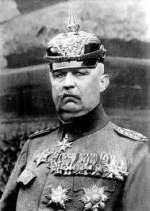
At the end of the war, he left Germany, and spent a year in Sweden, before returning to Germany, where, forgetting his own calls for surrender, he helped foster the myth of the 'stab in the back', which took the blame for the defeat away from the German army. He was a strong advocate of a war of revenge against France and Britain, and an early supporter of Adolf Hitler.
1921 Death: Talaat Pasha
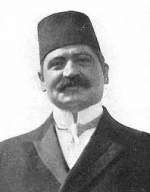
Considered the main perpetrator of the ArmenianGenocide--assassinated by the Armenian Revolutionary Federation. [For further information, click here.]
1923 Weimar: Ban on NSDAP: The No. I Court of the Reich Court of Justice rejects the appeals against the proscription of the NSDAP in Prussia, Saxony, Baden, Mecklenburg-Schwerin, Hamburg and Bremen. (Maser)
1935 Countdown to War: France extends compulsory military service for two more years.

1938 Anschluss: Austria enacts its first anti-Jewish laws since the Anschluss. Hitler places Hermann Goering in charge of the Austrian economy. (THP)
[See: Austria: The Other Germany.]
Anschluss: Michael Hellman, a young Austrian Jew, returns to Vienna from his studies at a yeshiva (Orthodox religious academy) in Slovakia, one day after Hitler's victory parade.

None of us had any inkling of what we would come back to. We came back to a city full of swastika flags flying from windows, slogans painted everywhere, "Ein Volk, Ein Reich, Ein Fuehrer," practically all passerby in the streets sporting swastika badges, police wearing swastika arm bands and the previously illegal SA, SS and Hitler Youth all walking about in uniform. It was like a nightmare come true . . . .
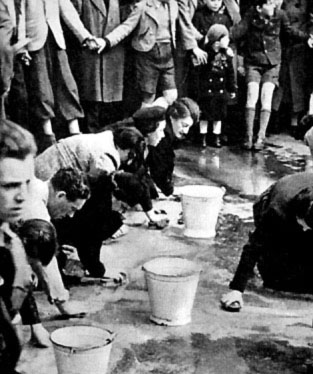
1939 Germans take Czechoslovakia:
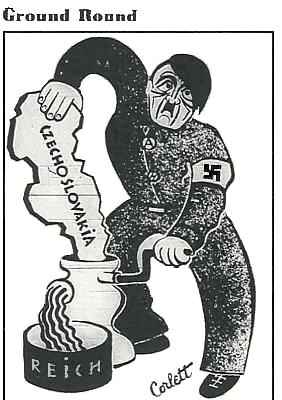
On this day, Hitler's forces invade and occupy Czechoslovakia—a nation sacrificed on the altar of the Munich Pact, which was a vain attempt to prevent Germany's imperial aims. On September 30, 1938, Adolf Hitler, Benito Mussolini, French Premier Edouard Daladier, and British Prime Minister Neville Chamberlain signed the Munich Pact, which sealed the fate of Czechoslovakia, virtually handing it over to Germany in the name of peace. Although the agreement was to give into Hitler's hands only the Sudentenland, that part of Czechoslovakia where 3 million ethnic Germans lived, it also handed over to the Nazi war machine 66 percent of Czechoslovakia's coal, 70 percent of its iron and steel, and 70 percent of its electrical power. Without those resources, the Czech nation was left vulnerable to complete German domination.
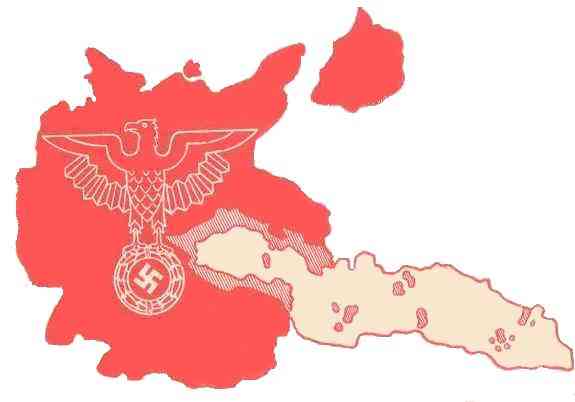
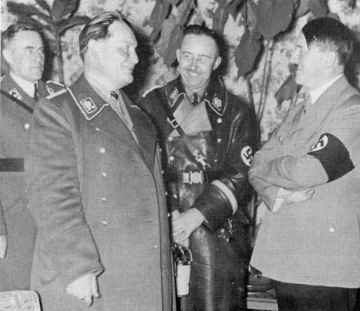
1941 Holocaust: Final Solution: Many mainstream historians believe that plans for the systematic murder of the Jews is finally decided on or about this date, in preparation for the invasion of Russia. Note: Others spuriously contend to believe it was a response to the passage of Roosevelt's Lend-Lease Bill and the Nazis perception that this was a violation of America's neutrality, inspired by a so-called international Jewish conspiracy. (See March 26) (THP)
[See: Was America Complicit in the Holocaust?]1942 World War II: Various: Third Battle of Kharkov:
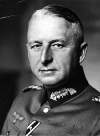
[The] last major strategic German victory of World War II. Led by Field Marshal Erich von Manstein, the Germans retook the city of Kharkov from the Soviet armies in bitter street fighting. The II SS Panzer Corps, equipped with heavy Tiger tanks, played a significant role. The II SS Panzer Korps originally comprised the Leibstandarte Adolf Hitler and Das Reich, both of whom had been resting and refitting for a long period of time and were now at full strength with new highly-trained recruits. Under the command of Paul Hausser, it checked the Soviet advance despite odds of 1:6, but, threatened with encirclement, was withdrawn against explicit orders from Hitler. The act infuriated Hitler who refused to award Hausser after the battle.
Church and Reich: Archbishop Konrad Groeber issues a pastoral letter for People's Memorial Day praising the "victorious German soldiers who are fighting a crusade against Bolshevism, protecting Europe from the Red tide." (THP)
Hitler's radio broadcast of this day:
We Germans do not care how the people in the rest of the world formulate their lives. However, the attempt of such nations who from outside of this continent are continuously meddling in strictly European affairs, and especially in matters concerning our own people, alone, will now forever be spoiled and made impossible.
1943 Holocaust: Greece: More than 2,800 Jews are deported during the first deportations from Salonica. They are told they will be "resettled" in Poland. (THP)
1944 World War II: Various: Battle of Monte Cassino: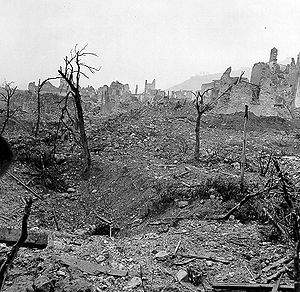
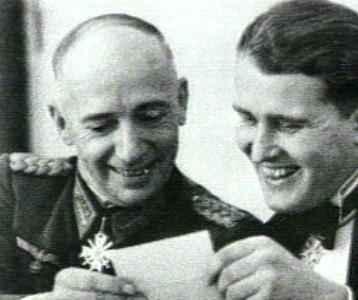
Wunderwaffen: Reports that Werner von Braun and a few of his colleagues had expressed regret that they were working on weapons instead of spaceships, and that they also had expressed opinions that the war was going against Germany, provides Himmler—who has been seeking to place the V-1 and V-2 programs under his personal control—the opportunity to arrest him. Von Braun is taken to a Gestapo cell in Stettin, Poland, where he will be held without any charges being filed against him. (Braun)
[See: Wunderwaffen: Hitler's Deception and the History of Rocketry.]Holocaust: Greece:
German authorities begin a systematic search for 10,000 Jews Greek Jews. 5,000 are soon caught and deported to Auschwitz. (THP)1945 World War II:Various:
Silesia:
Tribute by President Franklin D. Roosevelt on Seventh Anniversary of Merchant Marine Cadet Corps:

I know that the young Cadet-Midshipmen of the Cadet Corps have gone to sea in the face of peril and that many have sacrificed their lives. They and the price they have paid toward maintaining freedom shall long endure in the memory of a grateful nation. I know of their love for the sea, their loyalty to their ships, and I am confident of their continued success.
FDR to Churchill::
I cannot but be concerned at the views you expressed in your message of the 13th. I do not understand what you mean by a divergence between our Governments on the Polish negotiations. From our side there is certainly no evidence of any divergence of policy. We have merely been discussing the most effective tactics and I cannot agree that we are confronted with a breakdown of the Yalta agreement until we have made every effort to overcome the obstacles incurred in the negotiations at Moscow. (Churchill)
[See: Did Adolf Hitler Cause the Cold War?]
Churchill to FDR:
I am most relieved that you do not feel that there is any fundamental divergence between us, and I agree that our differences are only about tactics. You know, I am sure, that our great desire is to keep in step with you, and we realize how hopeless the position would become for Poland if it were ever seen that we were not in full accord. At present all entry into Poland is barred to our representatives. An impenetrable veil has been drawn across the scene. This extends even to the liaison officers, British and American, who were to help in bringing out our rescued prisoners of war. According to our information, the American officers as well as the British who had reached Lublin have been requested to clear out. There is no doubt in my mind that the Soviets fear very much our seeing what is going on in Poland. It may be that, apart from the Poles, they are being very rough with the Germans. Whatever the reason, we are not allowed to see it. This is not a position that could be defended by us. (Churchill)

Holocaust: The White Buses expedition gets underway as seven transports with some 2200 Danes and Norwegians are transported from captivity in Germany. Sven Frykmann, commander of one of the transports, will later write:
In general they were in relative good shape compared to other prisoners I have seen and one could not complain regarding their personal hygiene. They related that the food packs they had received from Norway and Denmark had kept their spirits up and recently the treatment had been noticeably better. They were all touching [sic] thankful and happy. I believe that all of us that have had the option of helping these poor people in Germany have experienced such an overwhelming gratitude that it is enough for the rest of our lives.
The transports will continue, with some pauses, until the May 4, 1945. According to the Swedish Red Cross a total of 15,345 prisoners are saved altogether. Negotiated by Swedish Red Cross envoy, Count Bernadotte, the White Buses expedition is a Swedish triumph and the return transports through Denmark are met by ecstatic crowds. British diplomat Peter Tennant, stationed in Stockholm during the war, will later write:
The Swedish humanitarian efforts under and after the war did much to remove the dishonor the country had got during its acrobatic exercises in neutrality policy. (Read, Persson)
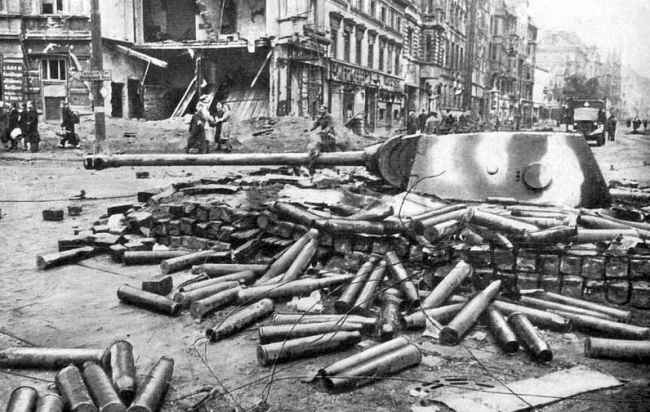
Berlin: General Reymann, Berlin's military commander, meets with Goebbels, the civilian commander of Berlin, to get the facts on the current situation facing the Nazi capital. 3 million civilians remain in the city, including—tragically—120,000 children under the age of 10. When Reymann asks Goebbels what provision has been made to insure that there will be enough canned milk —forget formula, which is non-existent—for the city's infants, the propaganda minister knowingly lies, declaring that there is enough to last a good three months. In fact, he claims, there is enough of everything—food, ammunition, weapons, and manpower—to hold out for two months. With a straight face, the practitioner of propaganda opines to the skeptical general:
Taken as a whole, the situation is extraordinarily satisfactory. Eight weeks is a long time, during which a lot can happen. In any case, we have made excellent preparations and above all it must be remembered that, if the worst should happen, an enormous number of men and weapons would flow into the city and we should be in a position to use them to put up a powerful defense.
Reymann discovers that evacuation plans consist of a map with 'escape routes' highlighted, but no provisions have been made for feeding the people or for their sanitary needs. Reymann asks Goebbels how the people will be fed: 'How will we feed them,' repeats Goebbels. 'We'll bring in livestock from the surrounding countryside, that's how we'll feed them!.' Reymann immediately realizes that this is a ludicrous proposition and insists that the civilian population should be evacuated:
Surely we must consider an immediate evacuation program. We cannot wait any longer. Each day that passes will multiply the difficulties later on. We must at least move the women and children out, before it's too late.
Goebbels: My dear general, when and if an evacuation becomes necessary, I will be the one to make the decision. But I don't intend to throw Berlin into a panic by ordering it now! There's plenty of time. Plenty of time.
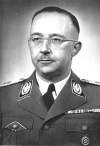
Waffen-SS: Himmler, having managed to get himself up from his hospital bed and make his way to the Fuehrerbunker, receives 'an extraordinarily severe dressing-down' from his enraged Fuehrer. Hitler has learned that one of his favorite generals, SS-Oberstgruppenfuehrer Sepp Dietrich, commander of the Sixth SS-Panzer Army—whose four crack Waffen-SS divisions include the Leibstandarte SS Adolf Hitler—has ordered his troops to retreat from the hopeless situation in Budapest. The sputtering warlord orders a petrified Himmler to force the 'traitorous' units to remove their 'loyalty is my honor' armbands.' When Himmler relays the order, Dietrich refuses to pass it down to the embattled soldiery. (Read)
[See: Why Did Hitler Insist on No Surrender?]1946 Nuremberg Tribunal: Colonel Friedrich Ahrens voluntarily surrenders himself to the Nuremberg IMT:
I'd heard over the radio that Hermann Goering's defence counsel had cited me as a witness in the Katyn case. I have come of my own free will and have made myself available.
Meanwhile, Goering continues his testimony:
I urged him (Hitler) most particularly not to start a war against Russia at that moment, or even a short time after; not that I was moved by considerations of international law or similar reasons; my point of view was decided by political and military reasons only. First, at all times since the seizure of power I, perhaps of all the leading men in Germany, was the only one who always considered conflict with Russia as a threatening menace to Germany. I knew‑-and many others with me‑-that for over 10 years an exceedingly strong rearmament and training program had been in effect in Russia, that the standard of living had been lowered in all other fields in favor of one single tremendous rearmament. The deliveries made by German industry and examination of the deliveries made by the American, British, and other industries always showed clearly that they consisted only of such machines as were directly or immediately necessary for a gigantic industrial rearmament program. One could thereby estimate the speed and the size of the Russian rearmament. If Germany had now developed in the way of communism, then of course the Russian rearmament, in my opinion, would have been directed against other danger. But since we had come to power, the inner political and ideological contrast naturally played, in my opinion, a menacing part. I have come to understand that such contrasts do not necessarily have to lead to conflicts between countries, because the political interests of nation and state will always be stronger and greater than all ideological contrasts or agreements. But here also I saw a menace, because what did this tremendous Russian rearmament signify at a time when Germany before the seizure of power, was impotent? I now told the Fuehrer that in spite of this basic attitude I always feared this danger from Russia and had always recognized it, but that I was asking him rather to leave this danger in abeyance and, if at all possible, to direct Russia's interests against England.
And further:
Prisoners of war were used for anti-aircraft operations mainly for those stationary batteries at home which were for the protection of factories and cities. And indeed these were auxiliary volunteers. They were chiefly Russian prisoners of war, but not entirely as far as I remember. One must not forget that in Russia there were various racial groups who did not think alike and did not all have the same attitude to the system there. Just as there were so-called East Battalions made up of volunteers, so there were also a great number of volunteers who, after the announcement in the camps, reported for service in the anti-aircraft batteries. We also had an entire company of Russian prisoners of war who volunteered to fight against their own country. I did not think much of these people, but in time of war one takes what one can get. The other side did the same thing.
From the diary of the British Alternate Judge, Mr. Justice Birkett:
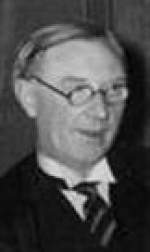
Goering reveals himself as a very able man who perceives the intent of every question almost as soon as it is uttered. He has considerable knowledge, and has an advantage over the Prosecution in this respect, for he is always on familiar ground . . . . If this procedure is followed (allowing the defendants all the time they care to consume on the stand) in the case of all the defendants . . . then the time taken will be so great that the trial will be written down as a failure. It will have done more to restore German belief in their leaders, and the verdicts against the leaders will be regarded by the German people as excessively unjust.
From the letters of Thomas Dodd:
I was in court all day and Goering continued on and he gets bolder and more doctrinaire with each hour. He is a supreme egoist and a consummate liar but a charming rascal. He is also a forceful talker and he knows how to tell a story. The other defendants are taking courage from him now but if Jackson does the proper job on cross(-examination) they will soon get over this new found confidence.

Wunderwaffen: A captured German V-2 is static-fired at White Sands. The above image is from the National Historic Landmark summary listing of the US National Park Service: This site is closely associated with U.S. testing of the German V-2 rocket, the origins of the American rocket program, and the leadership of Dr. Werner von Braun (1912-1977). The V-2 Gantry Crane and Army Blockhouse here represent the first generation of rocket testing facilities that would lead to US exploration of space.
1947 USFET is reorganized as EUCOM (US Forces, European Command).
1991 Germany formally regains complete independence—after the four post-World War II occupying powers (France, the United Kingdom, the United States and the Soviet Union) relinquish all remaining rights.
Edited by Levi Bookin (Copy editor) Click to join 3rdReichStudies FAIR USE NOTICE: This site may contain copyrighted material the use of which has not always been specifically authorized by the copyright owner. We are making such material available in our efforts to advance understanding of historical, political, human rights, economic, democracy, scientific, environmental, and social justice issues, etc. We believe this constitutes a 'fair use' of any such copyrighted material as provided for in section 107 of the US Copyright Law. In accordance with Title 17 U.S.C. Section 107, the material on this site is distributed without profit to those who have expressed a prior interest in receiving the included information for research and educational purposes. If you wish to use copyrighted material from this site for purposes of your own that go beyond 'fair use', you must obtain permission from the copyright owner. Please note that the list-owner and the moderator are not responsible for, and do not necessarily approve of,, random ads placed on our pages by our web server. They are, unfortunately, the price one pays for a 'free' website.
levi.bookin@gmail.com







